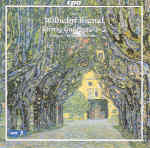One thing’s for sure: Wilhelm Kienzl was no lemming. Best known for his popular opera Der Evangelimann, he lived long enough (1857-1941) to witness inexorable changes in the musical landscape–from Wagner to the Second Viennese School–but he apparently was determined to remain firmly in the stylistic milieu of late Beethoven, Schubert, and above all, Schumann. In fact, Schumann was so important to Kienzl that he retreated from Wagner, in both personal and musical terms, after Wagner refused to concede the merits of Schumann’s music.
For whatever reason, CPO has made a mini-mission of exposing Kienzl’s antediluvian musings with recent releases of his opera Don Quixote and a disc of lieder (type Q4821 in Search Reviews). Aside from convenient sponsorship, this probably has something to do with the idea that even though the music sounds derivative, it’s still good, excellently constructed, and full of pleasant tunes.
Composed over a span of nearly 50 years, these three string quartets thus mark Kienzl’s enduring (but not necessarily myopic) view that, if it ain’t broke, don’t fix it. “Modernity” made Kienzl “wild” (so he is quoted in the disc’s liner notes), and he refused to move along with prevailing atonal winds. So what we have before us is essentially unambiguously conventional music that sounds just like Schumann, but is no less enjoyable for its sonic verisimilitude.
Each quartet pretty much sounds the same: the first movements have catchy, bracing themes; the slow movements are at times dolorous and elegiac; the scherzos and minuets are suitably light and witty; and the finales frolic with gusto, particularly the galloping Allegro energico from the youthful First quartet in B-flat minor. The Thomas Christian Ensemble, anchored by the eponymous first violinist but otherwise exhibiting the trappings of a session group assembled for recording purposes, really sinks its teeth into these works, playing them with all the weight and purpose typically accorded Kienzl’s much beloved predecessors.
































